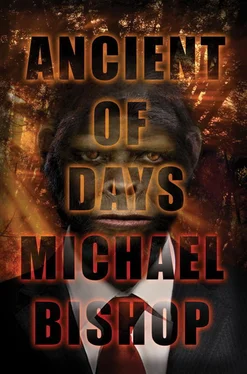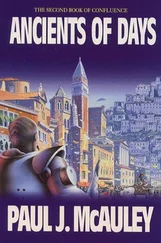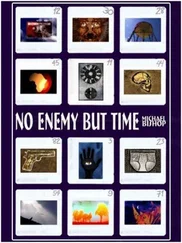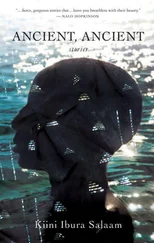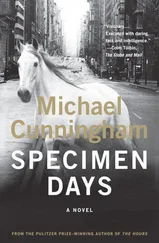“That’s not the approved term, Paul.”
“We met one on the boat over from Cap-Haïtien. He used the term. He even took a certain pride in it.”
“They do that, I guess. Instilling terror’s one of their collateral duties. They’ve been good to us , though.”
Caroline said, “Our Tonton Macoute told us the habilines here are extinct, victims of a Duvalier purge in the early sixties.”
“He’s right about the purge, wrong about extinct.”
“How many remain? When will we get to see them?”
RuthClaire laughed. “All in good time.” Still laughing, she swung the Jeep to the left to avoid hitting an old man wearing a straw hat and a polka-dot neckerchief of red and yellow. Behind the old man stumbled a donkey piled high with foraged firewood.
“What about Blair?” I asked.
“He’s here—another reason Adam didn’t come. He’s hosting the Great Man.”
“With or without his latex mask?”
Squinting at the unpaved, gully-riven coastal highway, RuthClaire sniggered. She was enjoying herself even as we traveled at ten miles per hour over terrain designed to inflict permanent kidney damage. She had not even asked about Tiny Paul’s ashes, and I was damned if I’d remind her that we had brought them.
From the air, Montaraz looks like the three-fingered hand of a Disney cartoon character: Goofy, Mickey Mouse, or that bird Donald Duck. The hand is tilted in Manzanillo Bay so that the thumb points northeast across a hundred miles of ocean at Grand Turk Island. The middle finger shoots a Donald Duck on a long northwesterly diagonal at Miami Beach. (So far as I know, no one in Miami Beach ever takes umbrage.) Rutherford’s Port nestles in its harbor at the base of the thumb, closer to the Dominican coast than to the Haitian. Our destination was an arc of beach on the inside edge of the island’s forefinger. Had there been a road straight across the interior, our trip would have taken no time at all, but no such road existed. Also, Austin-Antilles limits traffic on its coffee plantations, and their access-ways, to company vehicles. Consequently, our switchbacking journey along the coast took nearly an hour and a half.
The beach cottage was slightly more than a cottage—an adobe bungalow of beige stucco some three hundred yards from the road. A ridge of volcanic tuff and a phalanx of coconut palms and prickly-looking beach shrubs hid it from passersby. Whoever had stuccoed the cottage had adorned it with a low-level frieze of sea shells, shark’s teeth, sand dollars, and crab pincers. Red clay tiles shingled the roof, and an L-shaped screened-in porch clung to the building on two sides, one of them fronting the tiny inlet that locals called Caicos Bay. The sand here sparkled like refined sugar. RuthClaire and Adam had turned the porch overlooking this secluded strip of brightness into a studio. Easels, acrylics, canvases, and uncleaned brushes littered the shady L.
Blair, when we arrived, was sleeping, recuperating from a three-legged flight from Zarakal and a vicious case of jet lag. He had reached Rutherford’s Port yesterday afternoon. Although still vigorous at seventy-one, he no longer found it possible to move through time zones without suffering painful temporal discontinuities. His advisors told him that in flying westward he was “gaining” hours, stockpiling minutes that he could later add to the biologically determined span of his life. But the Great Man reminded them that they always depleted this surplus by flying him home the same way he’d come. Why didn’t they ever think to route him back to Marakoi over the Pacific Ocean and the Indian subcontinent? Because jet lag hung on to him like an unshakable bout of intestinal flu, he felt that he was a time-traveler whose time was rapidly running out.
Adam told this story after embracing us and showing us around the cottage. He recited most of it, in fact, while Caroline and I stood with him just outside Blair’s open bedroom door, looking in on the paleoanthropologist’s inert form and the sun-burnished tonsure of his massive head—like parents checking on a sick child. Blair snored while Adam talked: walrus-whistle arpeggios that overrode the lapping of the surf in Caicos Bay. We tiptoed off, and, in RuthClaire’s absence, I gave Adam Tiny Paul’s burial urn.
“Thank you from my heart.” Adam carried the urn into his and RuthClaire’s bedroom and set it on an end table by their bed.
Later, on the porch, Caroline and I had cold rum drinks with our host and hostess. We talked and talked, but never got too close to subjects that might be either emotionally painful or pertinent to our having come so many miles to see them. But that was the way we all wanted it on this first day, and we had a good time, anyway.
The next day, Blair was better: gallant, gracious, and witty. He spoke in the orotund tones of a word-drunk Welsh poet—a cross, said Caroline, between Dylan Thomas and Captain Kangaroo. It was hardly his fault that his every utterance put me in mind of a rutting sea lion. That afternoon, Caroline got out her notebooks and her recording equipment. The interview that she had agreed to moderate for Popular Anthropology took place in the cottage’s living room. RuthClaire and I were present, but we kept our mouths shut, and the tape spools turned inside their cassettes with a relentless whirr that trembled in the tropical air.
CAROLINE: It’s on, Dr. Blair. Why don’t you and Adam talk about whatever you like? I’ll stay out of the conversation—except for some followups and maybe some general explanatory comments. Okay?
BLAIR: That’s fine. Adam, I’ve spent better than fifty years digging up the bones of your ancestors and your collateral relations. It’s a surprise, and a profound honor, to meet a representative of your species in the flesh.
ADAM: Thank you.
BLAIR: Once, of course, I doubted. Except for you, I presume, your species is extinct. That any of your people have survived to this day is nothing short of miraculous. I’d scarcely be less astonished, Adam, if I were to go out and find Homo habilis fossils in a stratum containing the remains of Neanderthals and early Cro-Magnons. Your intrusion into even that stratum would have struck me as utterly fantastic six months ago. I would’ve had to assume that a smart-alecky mischief-maker was perpetrating a hoax: an inept hoax. How much more amazing to meet a hominid of that otherwise extinct kind—a living, breathing, English-speaking exemplar of Early Pleistocene humanity.
ADAM: Very much more, I would guess.
BLAIR ( laughing ): You’d be right, too. Listen, Adam, I hardly know where to begin. I’m a digger, not a diva of the interviewing trade, and far better with a fossil brush than a microphone.
CAROLINE: Your Peabody Award for Beginnings notwithstanding?
BLAIR: Never mind that. It was scripted. Adam, let me begin by asking you how you feel about the taxonomic terminology by which the scientific community has designated your species.
ADAM: Homo habilis?
BLAIR: Exactly. How do you feel about that nomenclature?
ADAM: About it, to be very candid, I have no feelings at all. Sticks and stones can break my bones, as the children sing, but names can never touch me. Hibber never touched me, either. It was to shrug off.
BLAIR: Does it strike you as accurate, Homo habilis?
ADAM: “Handyman”? Probably not. I am an artist, but around the house I am no good at all. Miss RuthClaire can vouch for my great un handiness in household matters. Dripping faucets confound me.
BLAIR: You’re a living fossil with your own fair share of funny bones, aren’t you? That’s quite a droll observation, but it’s not what I’m angling for, Adam. I wonder how you’d feel about adopting a somewhat different nomenclature. Homo zarakalensis , to be precise. I ask because it’s an unwritten tenet of contemporary civilization that free nations and free peoples have the right of self-determination when it comes to the matter of what they wish to be called. Rhodesia became Zimbabwe, for instance; and in the United States, fairly recently, most thinking Afro-Americans determined that they would rather be called blacks than Negroes. Do you see what I’m suggesting, Adam? Extinct species can’t tell us what they would like to be called. Living species, provided of course they’re human, do have that important option.
Читать дальше
